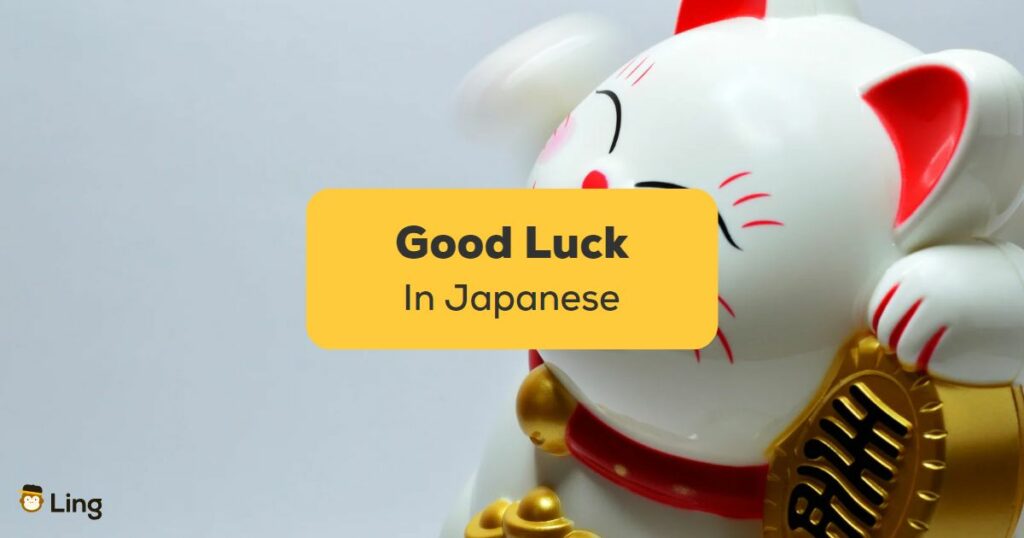Want to learn how to say good luck in Japanese? Or maybe you don’t know what to say, ganbatte or ganbare? Well, lucky you! We explained all of them in this blog post. Keep reading!
Want to wish your Japanese friend good luck in Japanese before their big day? Good! Because in this article, you’ll learn how to say it in seven different ways and what are the good fortune symbols in Japanese culture. After all, expressing good luck is one of the best ways by which you can immerse yourself in Japanese culture. You see, the locals are fond of exchanging good wishes regularly, even if the tasks may seem simple. And, you know what? The Japanese are right! Expressing good wishes is one of the best ways to improve cultural understanding and connect better with locals. So, let’s get started!
Page Contents:
- How To Say Good Luck In Japanese?
- What Does Ganbaru Mean?
- Ganbatte VS Ganbare: What’s The Difference?
- 7 Different Ways To Say Good Luck In Japanese
- Symbols Of Good Luck In Japanese Culture
- Summary
- Start Learning Japanese With Ling!
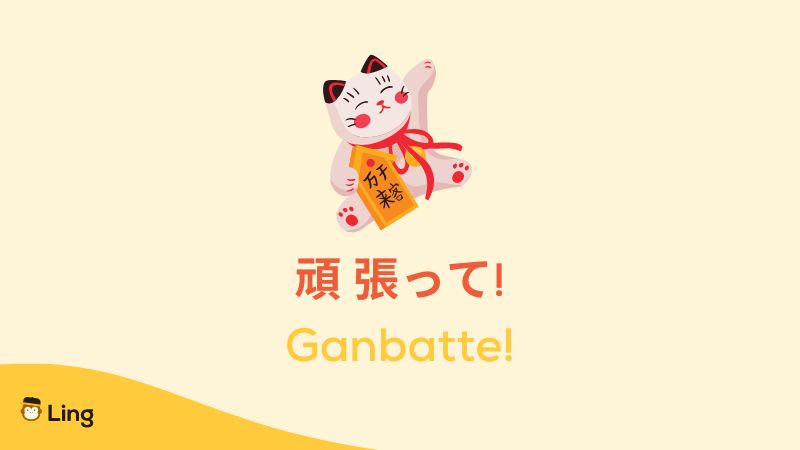
How To Say Good Luck In Japanese?
The most common and natural way to wish someone good luck in Japanese is 頑 張 って (ganbatte). This phrase is not the direct translation of good luck, but it is the most commonly used phrase by Japanese people. The literal translation of ganbatte is “give it your all,” similar to “do your best” in English.
You can say ganbatte to wish someone good luck for important events like an upcoming exam or job interview.
Here are two other versions of ganbatte:
- 頑張ってね。(Ganbatte ne.) – You got this! / Do your best, alright? (conversational, casual)
- 頑張ってください。(Ganbatte kudasai.) – Please do your best. (polite, formal)
What Does Ganbaru Mean?
頑張る (ganbaru) is a verb that literally means “to stand firm.” This ubiquitous Japanese word roughly means to slog on tenaciously through tough times. The word ganbaru is often translated to mean “doing one’s best,” but in practice, it means doing more than one’s best.
It makes sense because, in Japanese culture, finding value in the process of the effort itself is important. It doesn’t matter whether you succeeded or failed. You can see the ganbaru spirit everywhere in Japan; at work, school, or anything involving close collaboration.
Ganbatte VS Ganbare: What’s The Difference?
Both words are commonly used in day-to-day speech, and they almost have the exact same thing. The difference is in their tone word form. The word ganbatte (頑張って) is actually the conjunctive form of gambaru (頑張る). While ganbare (頑張れ) is in the command form, which has an imperative tone; ganbatte (頑張って) is the short version of ganbatte kudasai, which sounds like a request and hence sounds less demanding.
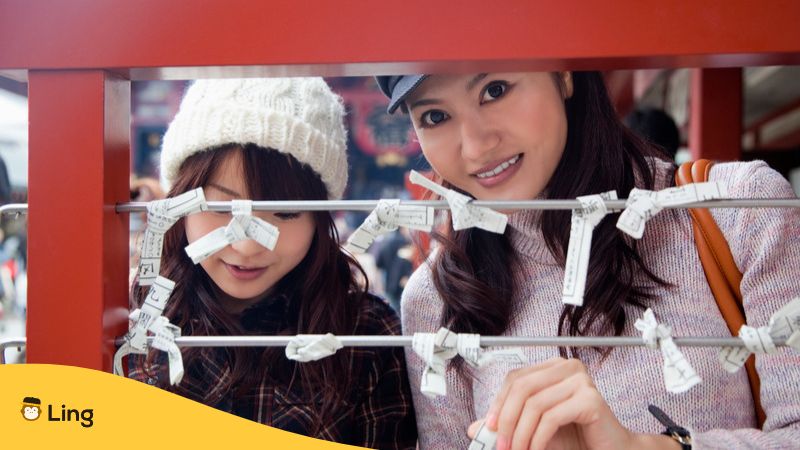
7 Different Ways To Say Good Luck In Japanese
You already know that the most common way to wish someone good luck in Japanese is ganbatte. But do you know the other natural expressions that native speakers use? Let’s learn the seven of them here!
1. 応援しています (Ouen Shite Imasu)
Meaning: I’m supporting you.
The exact translation is “I’m rooting for you,” and the word 応援 (ouen) means cheering and supporting. This phrase can help you show your utmost support for someone. You are likely to hear this phrase during competitions, races, and elections.
Here are the other versions of this phrase based on the formality level:
- 応援してるよ (Ouen shiteru yo) – Casual
- 応援させていただきます (Ouen sasete itadakimasu) – Very formal
2. うまくいくといいね (Umaku Iku To Ii Ne)
Meaning: I hope it goes well.
The direct translation of this one is, “if things turn out well, it will be good.” Though it is less frequently used compared to ganbatte, it is possible to hear this phrase used along with ganbatte to wish good luck.
3. 健闘を祈ります (Kentō O Inorimasu)
Meaning: Do your best.
健闘 (kentō) means “a good fight,” and 祈る (inoru) means “to pray.” You can say this phrase to someone when you want them to give it their all and put their effort into something to the fullest. This is a formal phrase, so it is not often used in casual situations.
It is usually used in semi-formal speeches before sporting events and competitions like football games to encourage the players.
Here are the other versions of this phrase based on the formality level:
- ご健闘をお祈りします (Gokentō o oinori shimasu) – Formal
- ご健闘をお祈りいたします (Gokentō o oinori itashimasu) – Very Formal
- ご健闘をお祈り申し上げます (Gokentō o oinori mōshi agemasu) – Super Formal
4. ご行員を祈ります (Gokouin O Inorimasu)
Meaning: I pray for your good luck.
Here is another very polite and formal Japanese expression that may come in handy if you work at a Japanese company.
5. 君なら出来るよ (Kimi Nara Dekiru Yo)
Meaning: You can do it.
You can use this phrase to express a kind of encouragement like “you can do it” in Japanese. This phrase literally means “If it is you, you will be able to do it.” In this case, 君 (kimi) means you (informal) but in some cases, 君 (kimi) can be replaced by the person’s name. Remember that 君 (kimi) is a word that you can use with someone on the same social level as you or lower. So it’s not appropriate to say 君 (kimi) to someone who has a higher social level than you such as your boss or professor.
6. ファイト (Faito)
Meaning: Keep going.
Sound familiar? Yep! Faito (ファイト) is actually a loanword, derived from the English word “fight.” You can hear Japanese people scream like this in sports competitions and contests. You can also say faito to encourage your friend before a big challenge like an exam or job interview.
Remember that this is a very casual expression, so make sure to say it among friends and family.
7. 運がいい (Un Ga Ii )
Meaning: Lucky.
運がいい (un ga ii) means having good luck, and it is an adjective to describe someone who is lucky. 運 (un) means something that can’t be controlled by your efforts from happening. So it can be translated as “fate” or “luck.” You can also say 運がいいね (un ga ii ne) to emphasize it.
Symbols Of Good Luck In Japanese Culture
Enough language talk. Let’s get to the cultural side! Did you know that in Japanese culture, there are a lot of symbols and traditions that are believed to bring good luck? Japanese people try to avoid bad luck as much as they can and that’s why they have different lucky charms. These Japanese good luck charms are called engimono (縁起物).
Here are some of the most popular engimono in Japan. Let me know which one is your favorite! My favorite is Maneki Neko! 😻
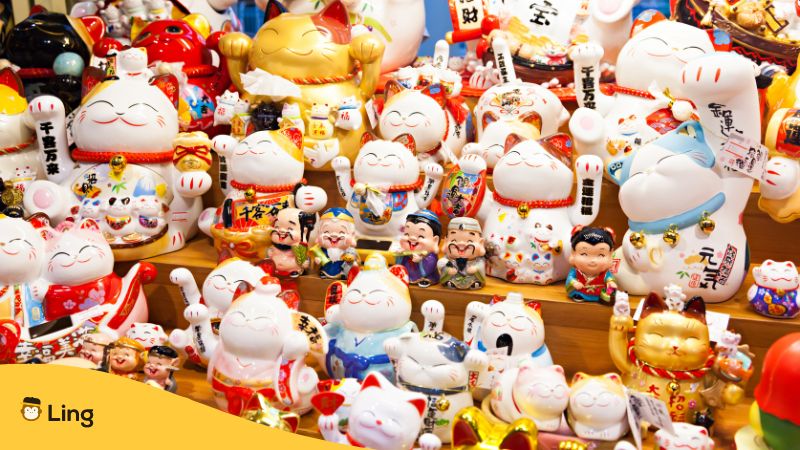
Maneki Neko (招き猫)
In general, cats are seen as lucky in Japan. The Maneki Neko (招き猫), also known as the Lucky Cat, is probably the most famous symbol of good fortune in Japan. They’re usually white but they come in different cat fur colors too. You can see the Maneki Neko on counters in Japanese shops.

Koi Fish (錦鯉)
Koi fish, also known as nishikigoi (錦鯉), lives in rivers and ponds. You can find beautiful koi ponds in most Japanese parks or gardens, sometimes you are even allowed to feed them. It is known that Koi represents perseverance and longevity.
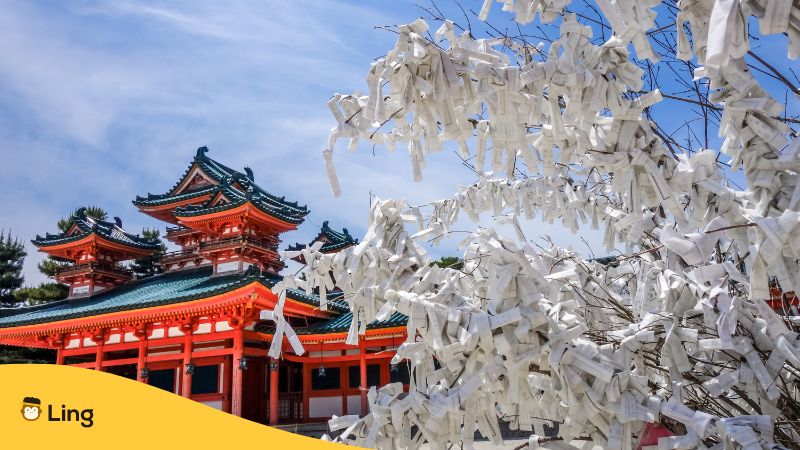
Omikuji (御神籤)
Omikuji (御神籤 ) is a kind of paper fortune that you can buy from Japanese shrines. They keep written predictions about your life, but not all of them are good. If you get a good prediction, you can take the paper home with you. However, if you get a bad one, tie it back to the specific corner of the shrine. So that you won’t bring bad luck with you and will leave it there.
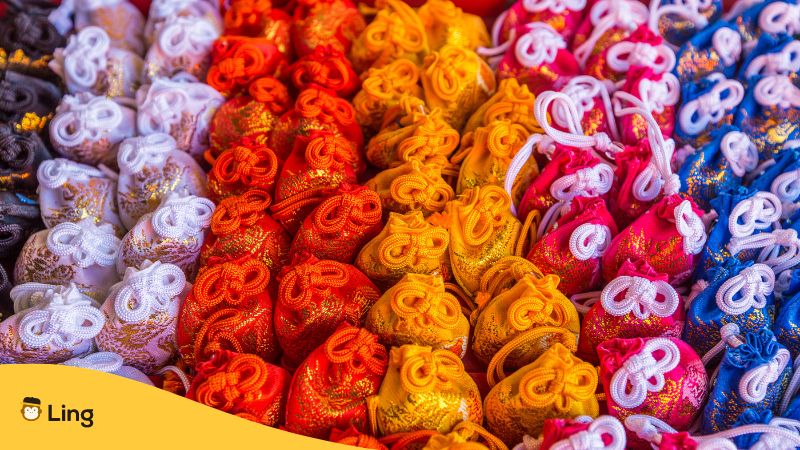
Omamori (お守り)
Omamori is basically a talisman in which small prayers are wrapped inside colorful silk. You can hang them on to any of your possessions or your home. Japanese people usually buy a new omamori at New Year’s time at a shrine. These talismans are believed to bring blessings into the owner’s life. There are different types of omamori:
- Katsumori (勝守) – For success
- Enmusubi (縁結び) – For love
- Kaiun (開運) – For good luck
- Shiawase (幸せ) – For happiness
- Gakugyoujouju (学業成就) – For education
- Yakuyoke (厄除け) – For keeping the evil away
- Shoubaihanjou (商売繫盛) – For more money
Summary
To sum up, let’s see what you’ve learned in this article so far! Here are the eight phrases to say good luck in Japanese :

Start Learning Japanese With The Ling App!
If you want to learn Japanese, Ling is here for you!
Ling offers easy-to-understand Japanese lessons that you can learn at your own pace. Just grab your iOS or Android device right now and head to Google Play Store or Apple App Store to download it. From bite-sized lessons to puzzles and an exclusive chatbot, you can practice real-life conversations and gain a better understanding of the Japanese language.
Thousands of learners use the Ling app to improve their language skills, so why not join them? Download Ling, and get ready to speak Japanese soon! Plus, don’t forget to visit our Japanese blog weekly to learn more about the Japanese language and culture!
Until next time, じゃあまたね!
